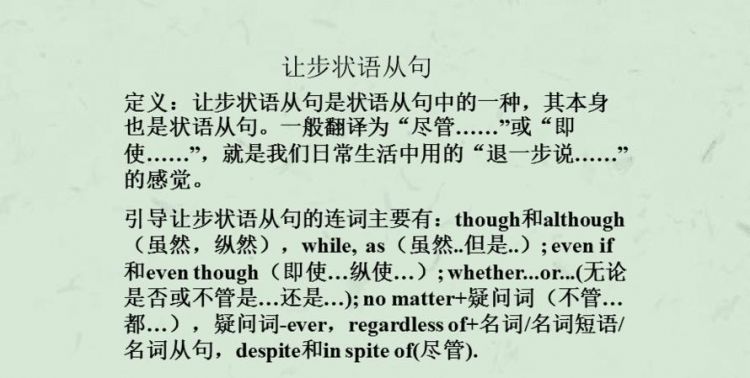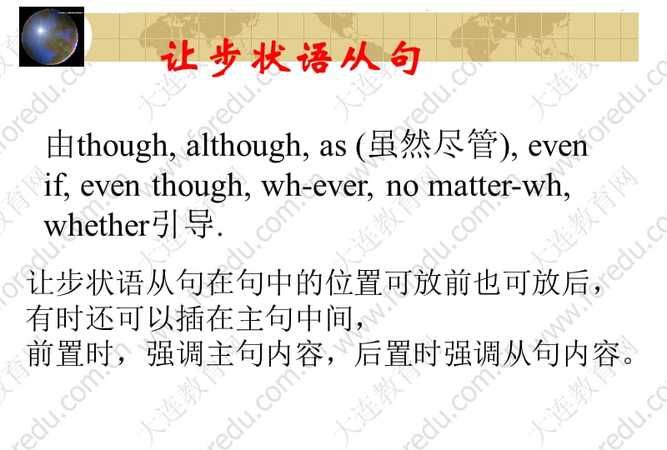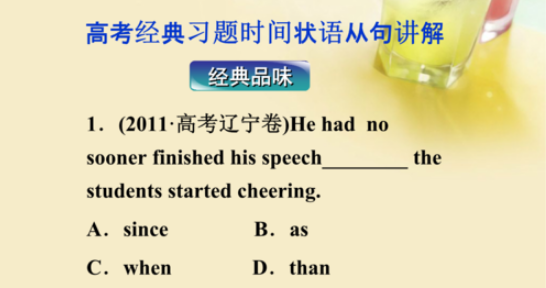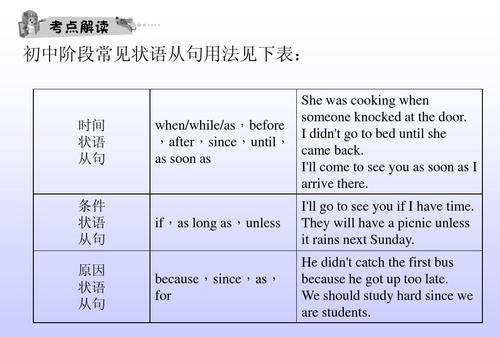本文目录
让步状语从句中的省略用法
让步状语从句中的省略
He is a good man, though sometimes (he is) rather dull. 他真是个好人,尽管有时有点无聊.
Even if (I am ) invited to, I won’t go to such a bad lecture. 即使邀我去,我都不想听如此坏的报告.
状语从句的省略原则主要是:如果从句中的主语和主句中的主语一致,就可以经过一定的变动把状语从句中的主语和谓语的一部分或全部省略,从而使语言更加简洁、明了.

状语从句中省略主语和谓语的两种情况
状语从句中的省略情况
在时间、条件、方式和让步装语从句中,当主、从句的主语一致,且从句中有be动词时,则可以同时省略从句中的主语和be动词。
When you are crossing the road, you must be careful.
= When crossing the road, you must be careful.
当时,当从句的主语是it时,也可以遵循这个省略原则。
If it is necessary, I will come to see you off tomorrow.
= If necessary, I will come to see you off tomorrow.

状语从句省略的条件
状语从句省略有以下情况:
一、时间状语从句中的省略:
1、When (she was) very young, she began to learn to play the piano.
译文:她很小时,就开始学习弹钢琴。
2、While (I was) at college, I began to know him, a strange but able student.
译文:我在上大学时就开始认识他,一个奇怪但有能力的学生。
注:as在引导时间状语从句时,没有这种省略现象,不可说As walking, she found a nice shining thing on the ground.

二、地点状语从句中的省略:
1、Lay these books where possible you can find them easily.
译文:把这些书放在你可能容易找到的地方。
2、Put in articles wherever necessary in the following passages.
译文:在下列文章中需要的地方填入冠词。
注:地点状语从句的省略常用下列结构:where(ver) possible, where(ver) necessary。
三、条件状语从句中的省略:
1、Send the goods now if (they are) ready.
译文:货物如果准备好了,请送过来。
2、He will come if (he is) asked.
译文:如果叫他来,他就来。
注:常用的句型是:if necessary, if possible, if true, if anyone等。
四、让步状语从句中的省略:
1、He is a good man, though sometimes (he is) rather dull.
译文:他真是个好人,尽管有时有点无聊。
2、Even if (I am ) invited to, I won’t go to such a bad lecture.
译文:即使邀我去,我都不想听如此坏的报告。
五、比较状语从句中的省略
1、She can play the piano just as wonderfully as you (do).
译文:她钢琴弹的我你弹的一样好。
2、She has finished the work earlier than (it has been )expected.
译文:她完成得比预期要早。
时间状语从句中什么时候当主句主语和从句主语一致是可以省略从句主语
状语从句主谓成分的省略,须遵循下面原则:
(一)当从句的主语与主句的主语一致时,从句可以省略主语,从句的谓语动词采用其V-ing结构。例如:
Although working very hard, he failed in the final exam. (Although he worked very hard)
After taking the medicine, she felt much better. (After she took the medicine)
If going there by air, we’ll have to pay twice the fare. (If we go there by air)
(二)当从句的主语和主句的主语一致时,若从句的谓语动词是系动词be或包含be的某种形式,此时从句的主语和be动词通常可以一同省略。常见于以下几种形式:
1、连词+形容词
Whenever (she is) free, she often goes shopping.她有空就去逛商店。
Work hard when (you are) young, or you'll regret.少壮不努力,老大徒伤悲。
2、连词+名词
While (he was) a young boy, he was always ready to help others.他在孩提时代就乐于助人。
3、连词+现在分词
While (she was) walking along the river bank, she was singing a pop song.她沿着河堤边走边唱着流行歌曲。
The boy is running impatiently here and there as if (he is) searching for something lost on the sports ground. 这男孩很不耐心地在操场上到处跑着仿佛在找什么东西。
4、连词+过去分词
If (it is) well read, the book will give you much to think.Unless (they were) asked to answer questions, the students were not supposed to talk in Prof. Li’s class.
5、连词+不定式
He stood up as if (he were) to say something.当时他站起来好像要说什么。
He wouldn't solve the problem even if (he were) to take charge.即使他来负责,他也解决不了这个问题。
6、连词+介词短语
She looked anxious as though (she was) in trouble.她看上去很焦急,好像遇到了麻烦。
He looked everywhere as if (he was)in search of something .他到处看似乎在找什么东西。
(三)若从句的主语和主句的主语不一致,但和主句的宾语一致时,从句中的主语和be动词亦常可省略。例如:
Father advised me not to say anything until (I was) asked.Granny told the children not to talk while (they were) eating.
(四)当从句的主语是it, 且谓语动词是be或包含be的某种形式时, it和be常可同时省略。例如:
If (it is) possible, he will help you out of the difficulty.如果可能的话,他会帮你摆脱困境。
You must attend the meeting unless (it is) inconvenient to you.除非情况对你来说不方便,否则你必须出席这次会议。

扩展资料:
在复合句中,担任状语成分的从句称为状语从句。时间状语从句说明主句动作发生或进行的时间。状语从句由连词引导,其位置通常可以放在句首或句末。放在句首是,常用逗号与主句分开;放在句末时,从句前面往往不加逗号。
引导的时间状语从句的主从复合句中,动作发生在先的用过去完成时,在后的用过去时。表示前面的叙述所没有提到过的信息。它总是对所描述的事件予以引人注目的强调,意为“这时;突然”。
引导时间状语从句的普通类从属连词有when(当……时),while(在……期间),as(当……,一边……一边……),before(在……之前),after(在……之后),since(从……以来),till/until(直到),whenever(无论何时),as soon as(一……就)等。
时间状语从句常用的连词有:when,as,while,before,after,since,till,until,as soon as,once。
参考资料:百度百科-时间状语从句
以上就是关于时间条件让步状语从句省略 ,让步状语从句中的省略用法的全部内容,以及时间条件让步状语从句省略 的相关内容,希望能够帮到您。

